- Home
- Neal Asher
Polity Agent Page 3
Polity Agent Read online
Page 3
The end? No, not really.
Skellor was tenacious, and escaping the dreadnought in its ejectable bridge pod, he again began to grow in power. He then resurrected a killer Golem called Mr Crane, and cut a bloody highway across space. ECS subsequently closed in, using improbably large forces to contain him. But perhaps it was because the Jain tech was now beginning to pursue its own final purpose, that ECS managed to finish him. Riddled with Jain nodes Skellor was finally trapped aboard an old colony ship in a decaying orbit around a brown dwarf sun, into which the vessel finally crashed.
Which goes to show that even godlike power is subject to gravity. One man, one Jain node: nearly a million dead. I’ll get more detail down later . . . I hope.
– From ‘How it Is’ by Gordon
Cormac kept his eyes closed and remained very still, expecting something to start hurting at any moment. When no pain became evident, he opened his eyes to observe the tangle of limbs and implements on the underside of a pedestal autodoc, just as it swung aside. The last he remembered, Jain technology had been crawling around inside his head, busy rewiring it, then the rest of his body had caught up with that damage by experiencing ten Gs of acceleration.
Right . . .
He licked his lips and tried to work up some saliva in his dry mouth, then announced, ‘The King of Hearts AI sends its regards. It wanted you to know it did not acquire any nasty Jain technology, so there’s no reason for you to chase after it and blast it into component atoms.’
‘That was remarkably quick,’ replied a voice just hinting at the massive intellect behind it.
‘That you, Jerusalem?’ enquired Cormac.
‘You already guessed that,’ replied the disembodied voice of the AI that controlled the titanic research vessel Jerusalem.
Underneath Cormac, the surgical table slowly folded upright, moving him into a sitting position. Peering down at himself he saw that he wore a skin-tight garment, his hands similarly clad, and the pressure around his face and head confirming that no part of his body remained uncovered.
‘Very strange pyjamas,’ he observed.
‘Cell welding, while wonderfully efficient, does have its limitations. Also, your spacesuit was breached and you lost nearly half your skin to vacuum freezing. This garment assists regrowth while allowing you to move about unhindered. It is my own invention.’
Cormac glanced around. He lay in a typical ship’s medbay. The pedestal-mounted autodoc had now retreated into an alcove beside a bench extending from one wall, which held a nanoscope, a chainglass containment cylinder, genetic scanner and nanofactory unit. By the bench stood a chair on which lay a familiar design of notescreen.
‘Where’s Mika?’
‘Sleeping.’
Cormac nodded and swung his legs off the surgical table. Now moving, he could feel the wrongness. He felt tired and weak, parts of him began to ache, and something felt odd about . . . everything.
‘What did you need to do to me?’
‘All relevant information is available to you via ship server. Why don’t you find out from there?’
A test perhaps? Cormac closed his eyes and sought mental connections via his gridlink. In something almost like a third eye he observed the optical cues for connection, but felt no actual linkage.
‘I’m offline.’
‘Yes, the damage to your brain was severe, and to remove Jain filaments from it and run a counteragent through would inevitably cause even more damage. I downloaded you, then reloaded you after I finished making repairs. Your link, because of the possibility it contained Jain informational viruses or worms, I completely wiped and reformatted. I similarly screened all your memories and thought structures.’
Cormac felt a clamminess.
Am I really Cormac now?
But there seemed no particular advantage in asking that question. Using his third-eye blink reflex, he cued the various channels of his link in turn and felt them reinstate. Now he could download data in just about any form to his link, either to view in his visual cortex, or so that it became part of memory – the mental component of physical skills, languages, the recorded experiences of others. In the link itself he possessed the facility to create programs: perceptile, search, analysis, logic trees . . . the list was only limited by his imagination, and his imagination need not be limited while he could link to so many sources of knowledge and experience within the human Polity. He opened a skeletal search program, altered its parameters to suit his requirements, and transmitted it to the nearest receiver. It came back with a report he scrolled up in his visual cortex. The report itself was overly technical and detailed, so he ran it through a filter to provide him with the gist:
Spinal reconnection in 2 lumbar regions; extensive bone welding of 116 fractures; the removal of 1 kidney, two thirds of the liver, 2 yards of intestine, 350 ounces of cerebral tissue; extensive cell welding in all areas; currently undergoing nanocyte repair and genetic reversion regrowth . . .
‘I thought I felt lighter,’ said Cormac. ‘Tell me, how much of my memory is still true?’
‘I reconstructed what I could, but perhaps ten per cent is missing.’
Cormac began walking round the surgical table.
Holes in my body and in my mind. Great.
Eventually he came to stand before a wall dispenser for disposable surgical clothing. Using the controlling touch-screen he selected a paper coverall, removed it from the dispensing slot and donned it over the garment he already wore.
‘What about my crew . . . and the Jack Ketch?’ Cormac asked reluctantly.
‘Jack, the ship’s AI, is safe, and Thorn and Fethan are presently on Cull. Cento and Gant are dead.’
‘Gant?’ he asked – he already knew about Cento.
‘Gant was terminally infected by a Jain informational virus that supplanted his mind. Thorn therefore destroyed him. There is, however, a back-up copy of him on Earth.’
Cormac grimaced. ‘The situation now?’
‘As you must have already surmised, Skellor is now just a pretty pattern on the surface of a brown dwarf sun. I have one Dragon sphere held in custody, and the planet Cull now has been granted provisional membership of the Polity while search teams locate, remove and isolate any stray items of Jain technology still there.’
Cento probably formed part of that same pretty pattern on that brown dwarf. Only pure luck had saved Cormac from the same fate.
‘You are currently in orbit of Cull?’
‘No, I am currently six hundred light years away.’
‘What?’
‘A rather knotty problem has arisen.’
Without cerebral augmentations Thorn could only view the memory in VR and absorb it by repetition. Fethan however, being a cyborg, loaded it directly into his mind so it became part of his memory.
‘What am I seeing here?’ Thorn asked, the VR representation freezing all about him.
‘The planet Osterland,’ Fethan replied, standing at his left shoulder. ‘Cold, about the orbit of Mars around an M-type sun, gravity one point two, plenty of water ice, but completely lifeless until fifty or so years ago. They used designer bacteria, biomass transfer through a cargo runcible, then an orbital mirror to heat the mix. Deciduous trees, with support ecologies, were planted right from the start, and are still being planted by agrobots.’
‘Trees?’
‘That was just the personal preference of the haiman in charge. He could have used fast growing slime moulds or adapted fungi to increase biomass. Instead he chose trees.’
‘Interesting, after what happened here, to discover a haiman rather than an AI in charge,’ Thorn noted. Haiman, he thought, an amalgam of human and AI – which meant this place was ruled, partially, by a human. And humans had never made trustworthy rulers.
‘I wouldn’t read too much into it – there’s not a lot of difference between the two.’
Thorn nodded and took another pace forwards on the platform that extended out from the town lying behind him. He a
lready knew that this platform would become, or had become, a jetty, as the space below it filled with water directed down great canals from the planet’s melting poles. Walking in someone else’s footsteps he finally came to the market located on the platform. Drizzle washed cold against his skin, for a storm approached from the northern outflow.
A dirty hand with chipped fingernails gripped his jacket. ‘I got some good stuff that ain’t on display, my friend,’ said its owner.
‘Like what?’ he asked . . . only it was not Thorn asking, but the recorded memory.
She was shabby, angry: one of those losers who came to a new world to start a new life and discovered that a change in location did not change what they themselves were. On the whole her goods matched her appearance. But then the memory persona noticed something else.
‘What’s that?’ it asked, pointing.
‘This is real coral, from the Barrier Reef on Earth.’
Thorn himself then spoke, and the representation froze again. ‘Do you reckon she knew what it really was? That this was a setup?’
‘Buggered if I know,’ Fethan replied. ‘Someone will have to ask.’
‘How interesting,’ said the persona, speaking from Thorn’s mouth. ‘All right, how much do you want for them?’
‘You’ll have to buy the whole carton,’ she replied. ‘Twenty shillings.’
‘I don’t want that egg thing, so I’ll give you ten.’
The memory faded, with the buyer returning towards the spaceport with his purchases.
‘A bargain,’ said Thorn. ‘Let’s back up to that stall again.’
He walked backwards to the stall, turned and placed the plastic carton down, and was in the act of taking back the ten-shilling chainglass coin when the representation froze again.
‘Just one piece of the Jain tech coral would sell for millions on the open market – if it even got there before an AI like Jerusalem snatched it,’ said Thorn. ‘The Jain node itself would start in the billions, and go on up from there, if it was actually possible to buy or sell such items. In reality the planet would end up under quarantine, and the buyer and seller would be mentally dissected by forensic AI.’
‘Ah, but who knew about Jain nodes then?’ asked Fethan.
‘End scenario,’ ordered Thorn abruptly.
At once Thorn was in darkness, and could feel nothing. Then, as the nanofilaments of the VR booth detached from his brainstem and withdrew from his head, he felt cold and stiff. The booth’s door crumped open before him and he stepped out onto the acid-etched floor. Fethan, standing to one side, an apparently old man with snaggle teeth, a mass of ginger beard and thinning hair topping a wiry frame clad in an envirosuit, detached an optic cable from the end of his right forefinger and allowed it to wind back into the wall. He then took a thimble of syntheskin from his pocket and pressed it into place over a metal fingertip that served as a multipurpose plug. Thorn eyed him meanwhile. Fethan was a cyborg, since he retained his own brain and spinal column flash-frozen and bio-gridded in a ceramal case inside him. He was not like Gant: the mind of a soldier loaded to a Golem chassis. But Thorn did not want to think about Gant right then.
‘So, how did you obtain this recording?’ Thorn asked.
‘Courtesy of Jerusalem. Apparently there was some bleed-over from Skellor to Cormac while they were linked. Jerusalem copied it while putting Cormac back together.’
Thorn surveyed his surroundings. A large hole had been burnt through one wall by the projectile saliva of a monster called a droon, then ripped open wider when it had crawled inside. The ceiling was missing, peeled back, from when the droon broke out again like a nightmare jack-in-a-box. This VR chamber was one remnant of a ship called the Jack Ketch, on which Thorn had arrived here on the planet Cull. He walked to the opening, stepped through and glared round at the arid landscape. Just within sight lay dusty pieces of carapace that were the remains of a sandhog the droon had killed.
‘And what exactly are we supposed to do with this piece of Skellor’s memory?’ He glanced up as a craft, shaped like an ‘H’ made from copper cylinders, drifted overhead. ‘This place is still under quarantine, and both of us have been in contact with Jain technology.’ Gant, the recorded mind of Thorn’s friend, once resided in a Golem chassis but, when they eventually found him, a Jain tech virus had turned him into something else. Thorn and Fethan had destroyed this object.
‘Jerusalem wants you to track this woman down.’ Fethan rejoined him. ‘And I think your ride just arrived.’
The H-shaped craft drew to a sudden halt above them, then began to descend. A hundred yards from the ground, it extruded four three-toed feet and, when it finally crunched down, one of them kicked away a nearby rock in seeming annoyance. Thorn estimated the craft to be 150 yards long and half that wide; a fully AG lander of the kind used for transporting dangerous cargoes. One strut of the H contained the ion drive, and possibly its controlling AI – though such ships were usually telefactored – and crew quarters if necessary. The other strut was a cargo pod, and the ship possessed the facility to blow this away from itself. Thorn was unsurprised when the circular end of the cargo pod opened and extruded a ramp like an insolent tongue.
‘Taking no chances, but this is an insystem ship, so where or to what is it carrying me?’ he asked as he began walking towards it.
Moving beside him, Fethan shrugged and made no comment.
Thorn glanced at him. ‘So you definitely are staying.’
‘I’m needed here.’ Fethan grimaced then removed something from his pocket, weighed it in his hand for a moment then tossed it across. Thorn snatched it out of the air and inspected it. It fitted in his palm, a five by three by a half inch cuboid of burnished metal, coppery, its corners rounded. Along one end of it was a row of ports, nanofibre and optic, designed to interface with just about any computer known, and probably many others unknown. It was a memstore.
‘It don’t say much, but it might come in handy,’ said Fethan.
‘What’s inside?’
‘It’s what killed that Jain tech construct down here, and what helped to kill Skellor in the end: a hunter-killer program constructed by Jerusalem.’ He patted his stomach. ‘I carried it inside myself for some time. I don’t need it any more and I don’t want it any more.’
They reached the ramp and paused there. Thorn held out his hand and they shook.
‘Stay well, Thorn,’ said Fethan, ‘and try not to let that bastard Cormac get you killed.’
‘You stay well, too. It’s been—’
‘Yeah, interesting.’ Fethan pulled his hand away and gestured towards the ship. ‘Get out of here.’ He turned and began walking away.
Thorn thoughtfully pocketed the memstore, then entered the cargo pod. Behind him the ramp immediately began withdrawing back into the floor. He spied just one acceleration chair bolted to one wall – there were no other facilities.
‘Spartan,’ he commented, then grinned to himself. He had, after all, himself been a member of the Sparkind who based their ethos on those ancient Greek warriors.
After he strapped himself in, the take-off was abrupt and sickening for, though the whole ship lifted on gravmotors, the pod itself contained no compensating gravplates. Sitting above the gravity-negating field he became immediately weightless. Strapped in his chair, and without a view, there was no way of telling how fast the ship was rising, or even if it rose at all.
Many space travellers, Thorn knew, had their temporal bone and its related nerves surgically adapted to enable them to shut down any physical response to signals from their inner ear. Others used drugs to dampen the effect. Sparkind, however, were conditioned to control their reaction, so Thorn merely clenched his teeth and held onto his breakfast. Within seconds he brought the disorientation and nascent space sickness under control, and relaxed. He remembered once watching one of the Cull natives being sick over the side of a balloon basket, prompting a subsequent conversation with Fethan about his own Sparkind conditioning.
<
br /> ‘Those must have been messy training sessions,’ Fethan had observed.
‘It was all carried out in VR and thus the sickness was just potential sickness to us trainees. Gant used to . . .’ Thorn trailed away. Gant was dead – again. He had continued, ‘It is just a matter of you deciding at first what is up and what is down, then finally deciding and accepting that there’s no up or down. Drugs and surgical adaptation disconnect you too much from realities, especially if you’re caught in a fire-fight aboard some tumbling ship with fluxing gravplates.’
‘Tough training, then?’
‘Yeah, you don’t get to become Sparkind without logging five years of combined virtual and actual combat training in similar rough situations.’ He glanced at Fethan. ‘The two are deliberately combined so you don’t get disconnected from reality. Troops fully trained only in VR develop a tendency to feel that what they then experience in actuality is something they can later unplug from. Makes ‘em sloppy, and very often dead. What about you? I know very little about you.’
Fethan grinned and scratched at his beard. ‘I worked for Earth Central way back before you were born, and even before memcording of a human mind became a viable proposition. I crashed a lander on Earth’s moon, after my passenger threw a grenade into the cockpit and, when I survived that, tried to decapitate me with a garrotte.’
‘Nasty person,’ Thorn opined.
‘Memcording wasn’t possible for a whole mind then, but partial recordings could be made. That bugger had overindulged in black-market memory copies made from the minds of imprisoned killers. The lander hit the ground but held together. Next thing I knew, everything was dark and EC was yammering at me non-stop. What was left of my body was too damaged to restore – oxygen fire. My choices were that dubious memcording technology of the time, or flash-freezing of my brain for storage, or installation in an android chassis – or death.’
‘Obviously you chose the android chassis.’

 The Bosch: A Novella (Polity Universe)
The Bosch: A Novella (Polity Universe)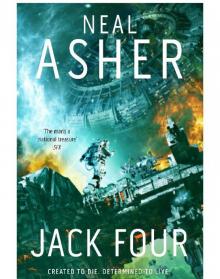 Jack Four
Jack Four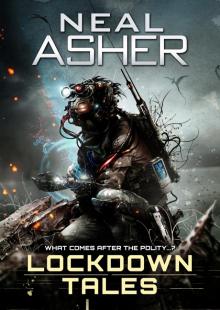 Lockdown Tales
Lockdown Tales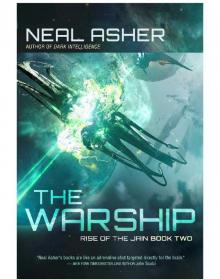 The Warship
The Warship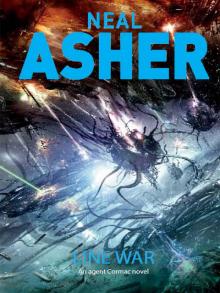 Line War
Line War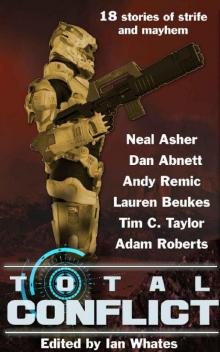 Total Conflict
Total Conflict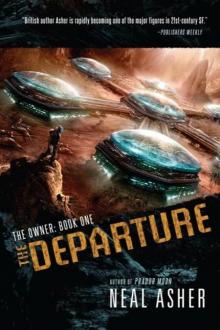 The Departure
The Departure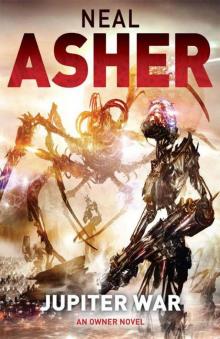 Owner 03 - Jupiter War
Owner 03 - Jupiter War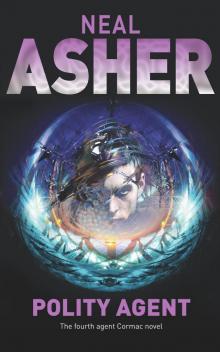 Polity Agent
Polity Agent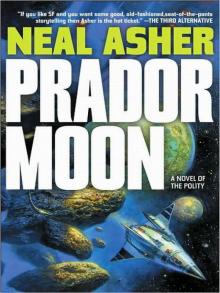 Prador Moon
Prador Moon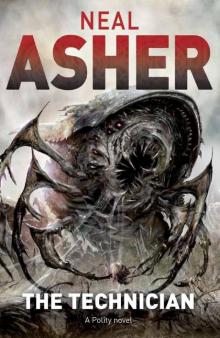 The Technician
The Technician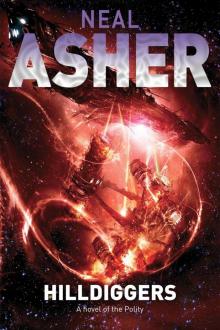 Hilldiggers
Hilldiggers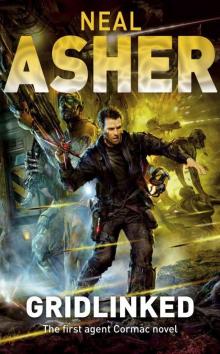 Gridlinked
Gridlinked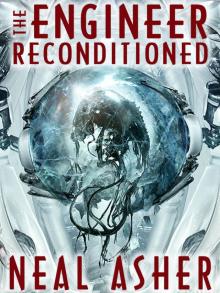 The Engineer ReConditioned
The Engineer ReConditioned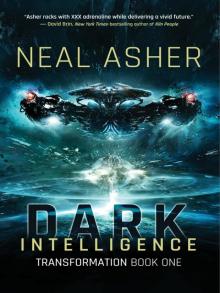 Dark Intelligence
Dark Intelligence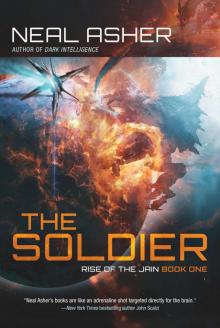 The Soldier: Rise of the Jain, Book One
The Soldier: Rise of the Jain, Book One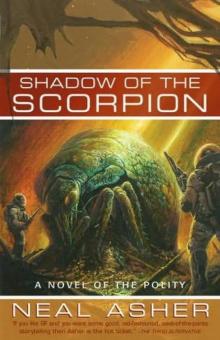 Shadow of the Scorpion p-2
Shadow of the Scorpion p-2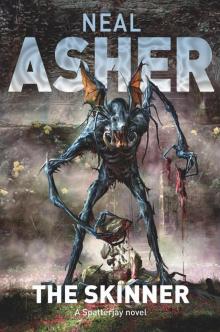 The Skinner
The Skinner The Soldier
The Soldier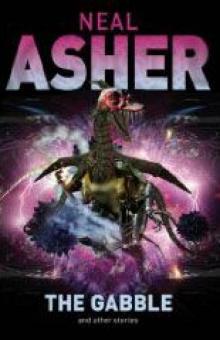 The Gabble p-13
The Gabble p-13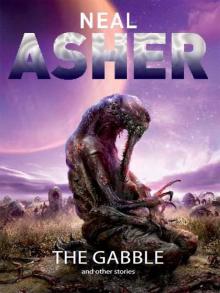 The Gabble and Other Stories
The Gabble and Other Stories The Parasite
The Parasite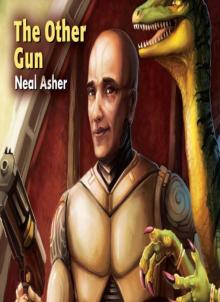 The Other Gun
The Other Gun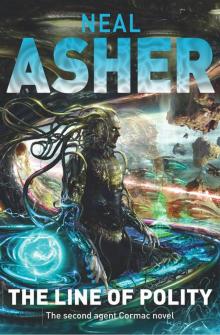 The Line of Polity
The Line of Polity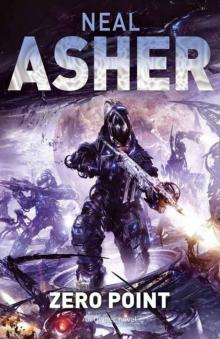 Zero Point (Owner Trilogy 2)
Zero Point (Owner Trilogy 2)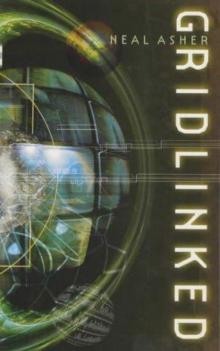 Gridlinked ac-1
Gridlinked ac-1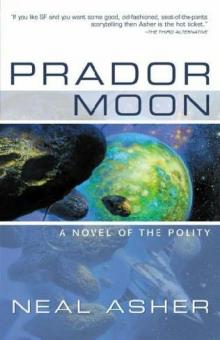 Prador Moon p-1
Prador Moon p-1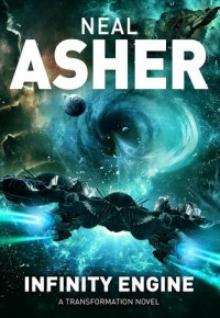 Infinity Engine
Infinity Engine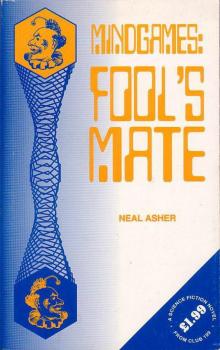 Mindgames: Fool's Mate
Mindgames: Fool's Mate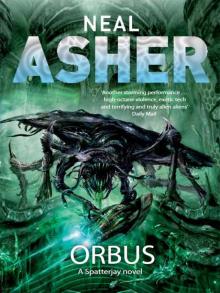 Orbus
Orbus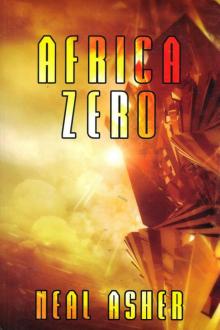 Africa Zero
Africa Zero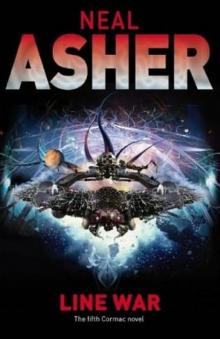 Line War ac-5
Line War ac-5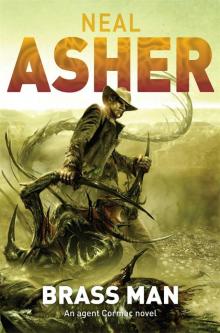 Brass Man
Brass Man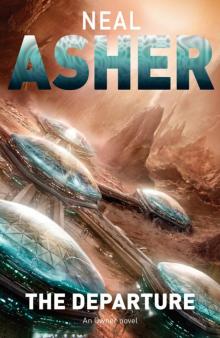 The Departure to-1
The Departure to-1 Cowl
Cowl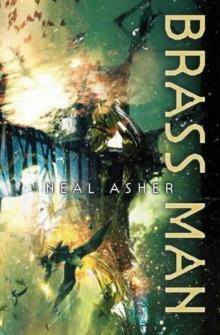 Brass Man ac-3
Brass Man ac-3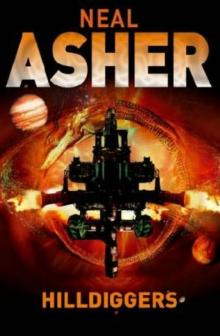 Hilldiggers (polity)
Hilldiggers (polity)![Greg Bear - [Eon Trilogy 1] - Eon (rescan) (v1.0) Read online](http://i1.bookreadfree.com/i2/04/08/greg_bear_-_eon_trilogy_1_-_eon_rescan_v1_0_preview.jpg) Greg Bear - [Eon Trilogy 1] - Eon (rescan) (v1.0)
Greg Bear - [Eon Trilogy 1] - Eon (rescan) (v1.0)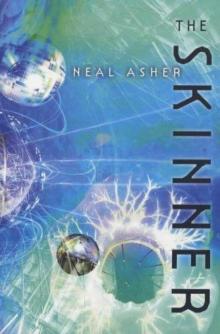 The Skinner s-1
The Skinner s-1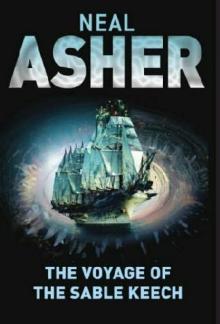 The Voyage of the Sable Keech s-2
The Voyage of the Sable Keech s-2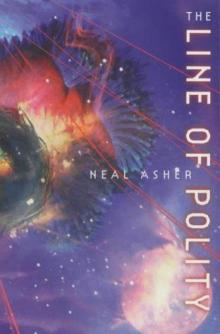 The Line of Polity ac-2
The Line of Polity ac-2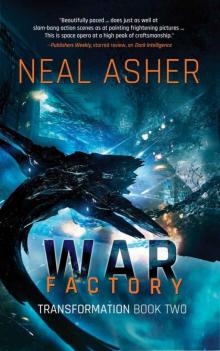 War Factory: Transformations Book Two
War Factory: Transformations Book Two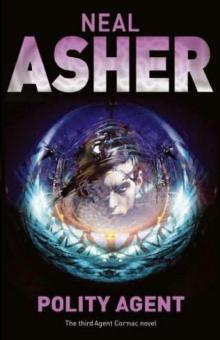 Polity Agent ac-4
Polity Agent ac-4